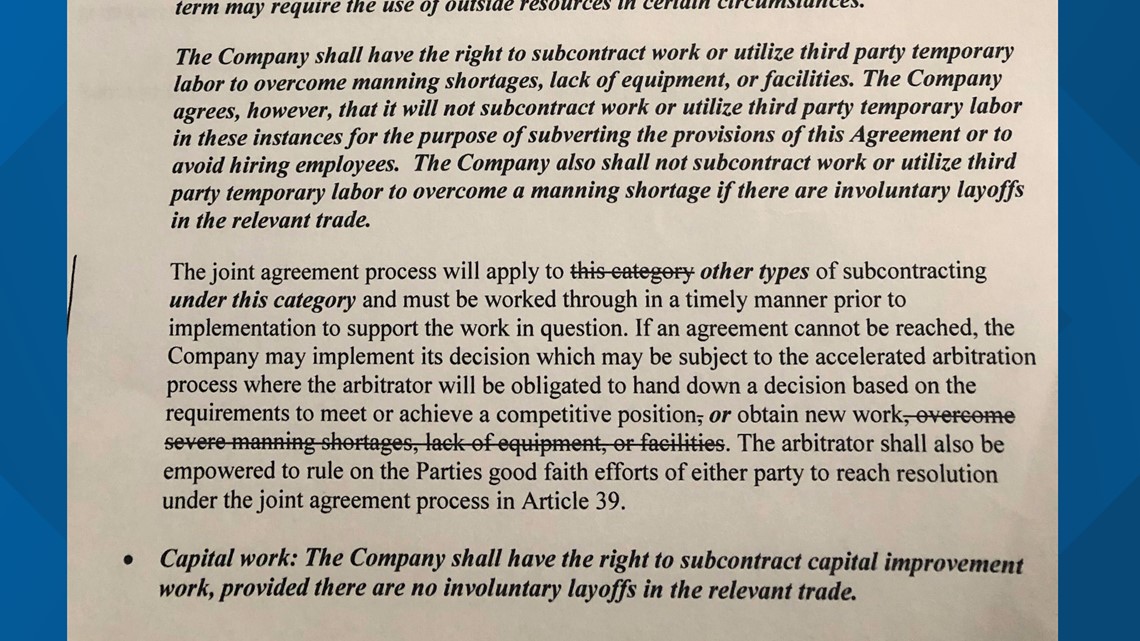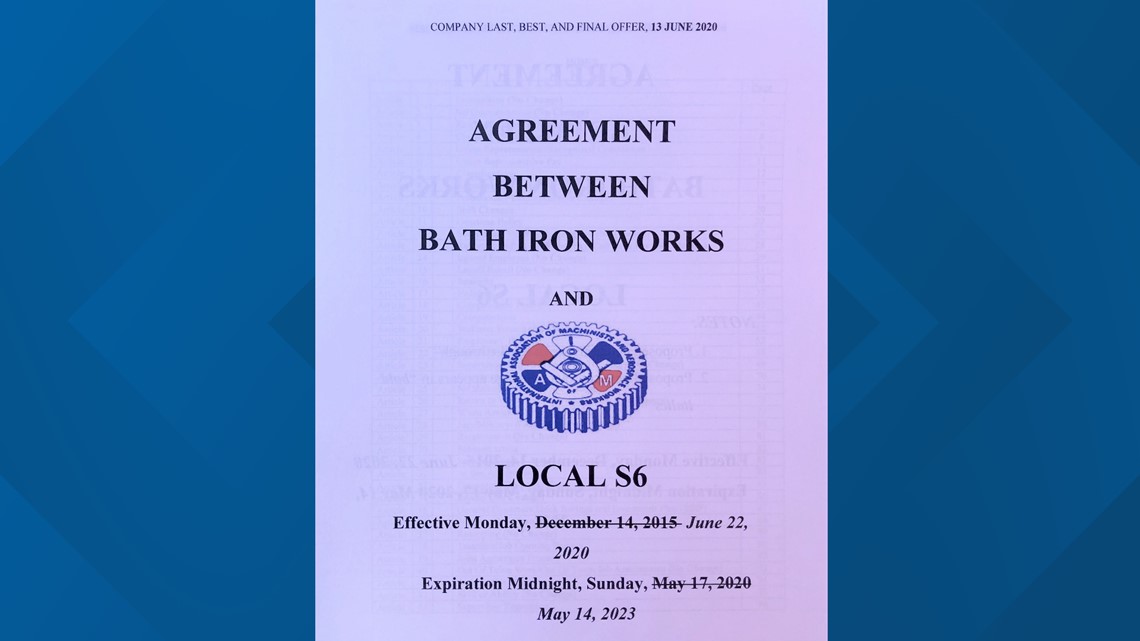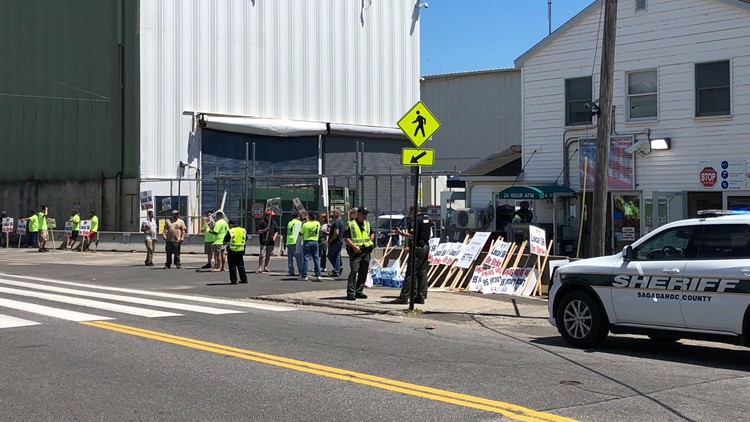More than 4,300 of Bath Iron Works' 6,700 shipbuilders were on strike effective at 12:01 Monday after contract negotiations broke down and 87 percent of voting union members supported a strike.
Just after midnight, workers who began their shift a half-hour earlier walked out of the shipyard and joined forming picket lines as part of the first strike at BIW since 2000.
The negotiating committee for Local S6 of the Machinists Union, the largest union at BIW, unanimously rejected the company's "last, best and final offer," which offered a three-percent raise in each of its three years. But the union argued the proposal would allow the company more flexibility to hire subcontractors -- which management says it needs to reduce its backlog of work -- and would change how BIW is required to adhere to seniority.


The proposal included a $1,200 signing bonus, three percent raises for each of the contract's three years, and held health insurance premiums stable, although it increased co-pays.
BIW hired 1,800 employees in 2019 and hopes to hire 1,000 this year, the company has said. President Dirk Lesko told NEWS CENTER Maine that he wants BIW to grow, but that they can't hire and train workers fast enough.
He told the Press Herald in May that BIW was six months behind in production.
But members of Maine's Congressional delegation also stepped in, writing on June 11 to Lesko and urging him to focus on "hiring, training and investing in Maine workers for these critical jobs instead of adding more subcontractors," the Press Herald reported.
RELATED: BIW, union prepare for strike
But voting over the weekend -- online and by phone -- resulted in 87 percent supporting a strike, which took effect just after midnight Monday morning.


In a statement Monday, BIW spokesman David Hench said, "At this time, the company is focused on activating its business continuity plan. In the near-term, this includes continued shipyard production with salaried personnel and others reporting to work. The company and the union have not discussed returning to the bargaining table, and there currently is no timeframe for doing so."
As the strike began, horns honked and vehicles "peeled out" in something of a party atmosphere, but by mid-morning Monday, those on the picket lines were discussing the reason they voted to strike.
Alvin "Doug" Hanks, 63, was working at the yard in 2000, the last time Local S6 of the Machinists Union, went on strike. He said Monday that while he has worked at BIW for nearly 33 years, and will retire in three or four, he walked the picket line for "these young guys" like 21-year-old Drew Madore, who grew up in Fort Kent and has been a welder at BIW for just more than two years.
"It's time we showed corporate America that they can't just replace the hard workers and keep this country going," Hanks said. He said he voted against the contract because "all the loopholes would allow them to bring subcontractors into every trade and once they start doing that, then they can subcontract everybody's job out."
"As far as I'm concerned, they're just trying to get rid of the union as a whole," Madore said. "Everyone just fighting for a fair contract and fair work practices."
While the most recent contract proposal included three-percent raises for each of its three years, many union members remember all too well negotiations for the last contract, which ultimately provided for annual bonuses but no raises for the length of the contract.
Prior to the contentious negotiations in 2016, tensions between the union and then-BIW President Fred Harris had erupted several times.
In March 2016, nearly 1,000 members marched the length of the shipyard to protest changes proposed by Harris.
Members have complained since the last contract was signed that they were tricked by Harris into making concessions to help BIW win contracts to build an entire class of new Offshore Patrol Cutters for the U.S. Coast Guard.
Harris said in 2015 that the union concessions were necessary to win the Coast Guard contract and avoid laying off about 35 percent of the company's workforce, or 1,200 employees, the Bangor Daily News reported.
BIW lost the Coast Guard contract to Eastern Shipbuilding in Florida the following year, and then earlier this year lost out on a $5.5 billion contract to build 10 of a new class of guided-missile frigates to Italian shipbuilder Fincantieri, with the frigates to be built at their Marinette Marine in Wisconsin.
Strikes are not new to the shipyard. Following one in the 1970s, in June 1985, BIW sent its 6,900 employees home and locked the gates just prior to a strike, The New York Times reported at the time.
The union at the time represented 4,500 employees, and had rejected the company's "final offer," including a three-year wage freeze and major benefits concessions, the Times reported.
In 2000, a 55-day strike shut down the shipyard after workers said the company's proposed wages and changes in work rules were unsatisfactory. They fought for increases of 7 and 8 percent per year over a three-year contract.
On Monday, Hanks remembered that strike.
We didn't [strike] long enough and we come back for less," he said. "There's got to be some give and take. The union has given and given and given and the company has taken and taken and taken ... I think the company thinks we're going to cave. That's what happened the last few contracts. I don't think we're going to."
Madore, who trained as a welder at Washington County College, said he and others are "absolutely prepared" for the strike. He said he and others expected a strike, have been saving when they can, and he's confident he'll be able to find work as a laborer to hold him over.
"I have other places I can make a living. There are places hiring around here. I haven't talked to anyone who is concerned about not working for these next three months or however long it takes ," he said. "I'm not counting on Bath Iron Works."
"I think we're all going to hold out here and get what we want," Madore echoed. "We're not going to bow down to them."
In a BIW employee forum, longtime employees warned newcomers on Monday, "This is no game. We are up against a very big corporation with very deep pociets, with loyalty only to the mother ship and shareholders."
Deputy Chief Andrew Booth of the Bath Police Department worked Monday from an incident command post at an undisclosed location. Booth said they worked at the site to allow for physical distancing according to CDC guidelines for COVID-19 precautions.
Booth said the police department began working with BIW management and the union on updating an old strike plan when the time for negotiations neared.
On Monday, members of the Maine State Police, along with Portland and Bath police, were at the command post, while Bath officers and deputies from the Sagadahoc County Sheriff's Office -- also located in Bath -- were stationed at various gates at the main shipyard.
Brunswick police officers were at several BIW facilities in that town.
"I'm really pleased," Booth said at about 1:30 p.m. "It was a little loud last night at 12:01. It was quite the party atmosphere, but we addressed the issue with union leadership."
Bath Police Chief Michael Field, as well as Sgt. Dan Couture and Officer Marc Brunelle were all on the Bath force during the strike in 2000.
Booth said that strike "was a lot more boisterous and loud," and union members blocked public ways resulting in several arrests for disorderly conduct.
But he said the current union leadership is "very influential" with its members.
"We're planning for the worst and hoping for the best, and so far, it's been [the best]," Booth said.
Local S6 received a special event permit from the city clerk and is responsible for the costs associated with the event.
BIW and the union will each share some of the costs of law enforcement during the strike, Booth said, but no agreement has been signed.
Booth said he couldn't say how many officers were on duty on Monday, but he said they were prepared to work around the clock if necessary.
Local S6 President Chris Wiers said in a statement that the 87 percent vote in favor of a strike "should send a signal to BIW to do what’s right and negotiate a fair contract."
"We are proud to build the best ships in the world and we want to keep it that way," Wiers said continued. "We are fighting for good jobs for the Maine economy. We want jobs at the shipyard to be high quality jobs that members can earn a decent living in over a long career. We are adamantly opposed to BIW’s demands to rollback worker protections and job quality standards, to massively increase subcontracting and to gut the language in our contract that makes these decent, safe jobs. We will stand together until we get the respect and the fair contract that we deserve."
Maine AFL-CIO President Cynthia Phinney in a statement:
"This should send a crystal clear message to BIW management: respect your workers, go back to the bargaining table and negotiate a fair contract,” said "Shipbuilding is difficult, dangerous, physically demanding work that wears out workers’ bodies. The union has struggled and bargained over decades to make these safe, quality jobs that Maine workers can survive in over a long career and earn a decent living. BIW proposals roll back job quality, worker protections and safety. That’s why workers overwhelmingly rejected this contract. All over this state and country the essential people are rising up to demand respect, justice and a fair share of the wealth we create. The broader labor movement stands with the workers at BIW in their struggle for a fair contract.”
Robert Martinez Jr., international president of the International Association of Machinists and Aerospace Workers (IAMAW) said more than 600,000 union members supported the S6 employees "as they stand up for justice and dignity on the job."
“This strike is about more than wages and benefits. It is about working people having a voice in their futures and taking a stand for their families and the state of Maine. Despite our repeated warnings to the management of Bath Iron Works, this employer has continued to take taxpayer dollars and outsource good Maine jobs to out-of-state contractors. The company is engaged in flat-out union-busting, and is exploiting the current pandemic to attempt to outsource work from its dedicated employees, who are risking their health to build ships that protect our national security. I salute our membership, who were left with no choice but to strike to defend the livelihoods of themselves, their families and their communities.
“For generations, our members at Local S6 in Bath have proudly built the military ships that keep our servicemen and women safe. They are the reason why ‘Bath Built is Best Built.’ We simply ask that management recognize the sacrifices our members have made, and work with us to find a solution that promotes the well-being of our membership, their families and the entire state of Maine.”



